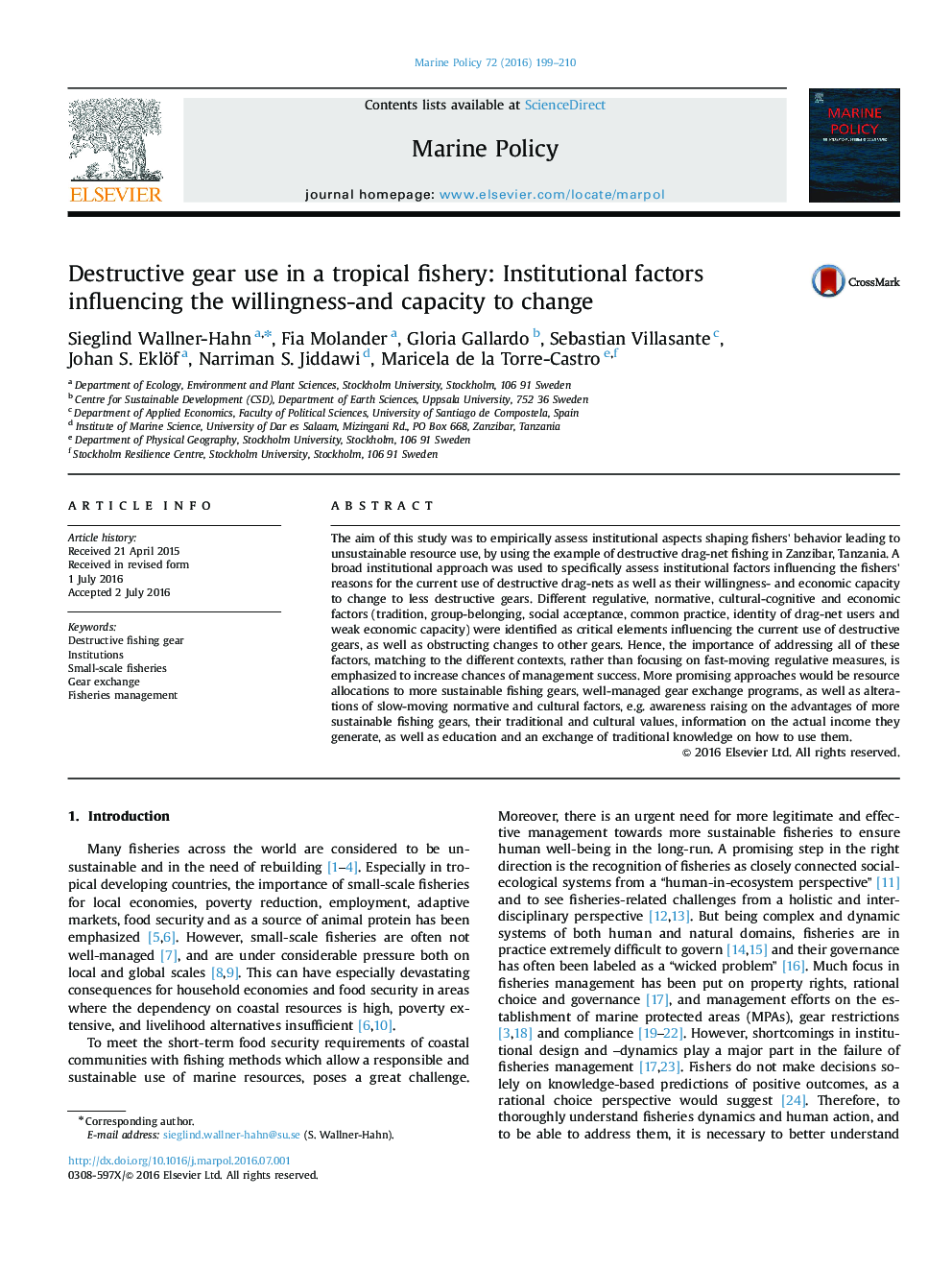| کد مقاله | کد نشریه | سال انتشار | مقاله انگلیسی | نسخه تمام متن |
|---|---|---|---|---|
| 7488900 | 1485507 | 2016 | 12 صفحه PDF | دانلود رایگان |
عنوان انگلیسی مقاله ISI
Destructive gear use in a tropical fishery: Institutional factors influencing the willingness-and capacity to change
ترجمه فارسی عنوان
استفاده از دزدی مخرب در ماهیگیری استوایی: عوامل نهادی که بر تمایل و ظرفیت تغییر می کنند
دانلود مقاله + سفارش ترجمه
دانلود مقاله ISI انگلیسی
رایگان برای ایرانیان
کلمات کلیدی
دنده ماهیگیری مخرب، موسسات، ماهیگیری کوچک چرخ دنده، مدیریت شیلات،
ترجمه چکیده
هدف از این مطالعه، تجربی، بررسی جنبه های سازمانی رفتار ماهیگیران که منجر به استفاده از منابع نامناسب می شود، با استفاده از نمونه ای از ماهیگیری مخرب دریایی در زنگبار، تانزانیا، ارزیابی می شود. یک رویکرد نهادی وسیع برای مشخص کردن عوامل سازمانی که بر دلایل ماهیگیران برای استفاده فعلی از شبکه های مخرب و همچنین قابلیت تمایل و توان اقتصادی آنها برای تغییر در ابزارهای مخرب استفاده می شود، مورد استفاده قرار گرفت. عوامل مختلف نظارتی، هنجاری، فرهنگی-شناختی و اقتصادی (سنت، وابستگی گروهی، پذیرش اجتماعی، رفتار معمول، هویت کاربران شبکه کشیدن و ظرفیت اقتصادی ضعیف) به عنوان عوامل حیاتی برای استفاده فعلی از ابزارهای مخرب نیز شناخته شده اند به عنوان مانع از تغییر در سایر دنده ها. از این رو، اهمیت دادن به همه این عوامل، مطابقت با زمینه های مختلف، به جای تمرکز بر اقدامات مقدماتی سریع حرکت، برای افزایش شانس موفقیت مدیریت تأکید می شود. رویکردهای امیدوارکننده تر، تخصیص منابع به ابزارهای ماهیگیری پایدارتر، برنامه های تعویض دنده به خوبی مدیریت شده، و همچنین تغییرات عوامل هنجاری و فرهنگی آهسته حرکتی، به عنوان مثال افزایش آگاهی در مزایای استفاده از ابزارهای ماهیگیری پایدار، ارزش های سنتی و فرهنگی آنها، اطلاعات مربوط به درآمد واقعی آنها، و همچنین آموزش و تبادل دانش سنتی در مورد چگونگی استفاده از آنها.
موضوعات مرتبط
مهندسی و علوم پایه
سایر رشته های مهندسی
مهندسی دریا (اقیانوس)
چکیده انگلیسی
The aim of this study was to empirically assess institutional aspects shaping fishers' behavior leading to unsustainable resource use, by using the example of destructive drag-net fishing in Zanzibar, Tanzania. A broad institutional approach was used to specifically assess institutional factors influencing the fishers' reasons for the current use of destructive drag-nets as well as their willingness- and economic capacity to change to less destructive gears. Different regulative, normative, cultural-cognitive and economic factors (tradition, group-belonging, social acceptance, common practice, identity of drag-net users and weak economic capacity) were identified as critical elements influencing the current use of destructive gears, as well as obstructing changes to other gears. Hence, the importance of addressing all of these factors, matching to the different contexts, rather than focusing on fast-moving regulative measures, is emphasized to increase chances of management success. More promising approaches would be resource allocations to more sustainable fishing gears, well-managed gear exchange programs, as well as alterations of slow-moving normative and cultural factors, e.g. awareness raising on the advantages of more sustainable fishing gears, their traditional and cultural values, information on the actual income they generate, as well as education and an exchange of traditional knowledge on how to use them.
ناشر
Database: Elsevier - ScienceDirect (ساینس دایرکت)
Journal: Marine Policy - Volume 72, October 2016, Pages 199-210
Journal: Marine Policy - Volume 72, October 2016, Pages 199-210
نویسندگان
Sieglind Wallner-Hahn, Fia Molander, Gloria Gallardo, Sebastian Villasante, Johan S. Eklöf, Narriman S. Jiddawi, Maricela de la Torre-Castro,
